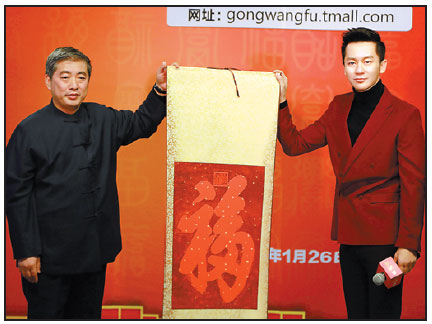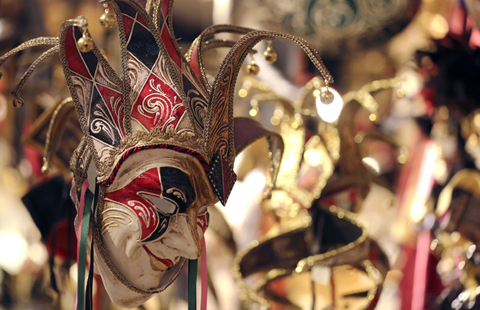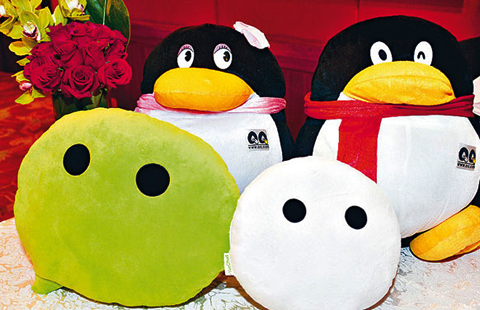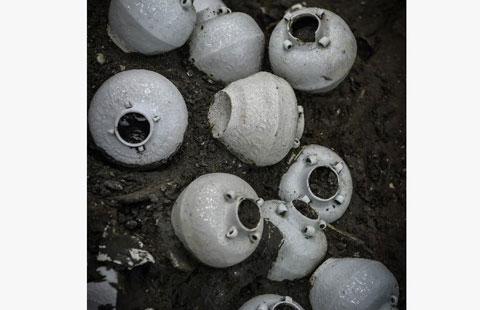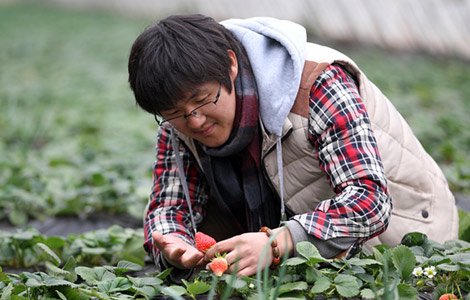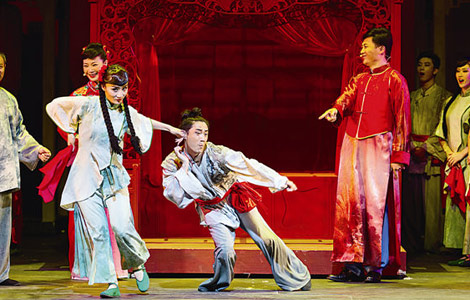Prince Kung's Mansion sets up shop online
Updated: 2015-02-03 08:01
By Wang Kaihao(China Daily)
|
||||||||
A luxurious two-century-old residence in Beijing is getting the public's attention with a new effort to spread its message and goods via cyberspace, just in time for the Spring Festival.
Prince Kung's Mansion in the hutong area of Shichahai opened its virtual store on China's major online shopping website Tmall (gongwangfu.tmall.com) last week, becoming the country's first major historical and cultural site protected at the national level to establish its own online flagship store.
The first items in the cyberstore are mainly souvenirs, including cartoon figurines based on historical figures and miniature sculptures of auspicious animals. The highlight: various products developed from the character Fu, which means happiness, written by Emperor Kangxi (1654-1722). The calligraphy is carved on a stone tablet in the mansion's garden.
"Brand value is crucial for a cultural institution," says Sun Xuguang, director of the administration office of Prince Kung's Mansion. "Old museums should update their mindsets to embrace e-commerce. An online flagship store will also help us to protect intellectual property."
He says 16,800 sets of Fu products, including six pieces of Chinese New Year decorations and couplets, were one important move to build up their brand. No matter how Chinese people are doing in life at any given moment, he says, "it will always be right to send them best wishes for happiness" during the Spring Festival.
The mansion, covering about 60,000 square meters, was first built in 1777 for Heshen, a wealthy court official during the reign of Qianlong (1736-96). Heshen was later executed for corruption, and Aisin Gioro Yixin, who was titled Prince Kung and a major initiator among Manchu royal family of modern diplomacy and education, became its owner late in the 19th century.
"It will be no exaggeration to say the mansion represents half of the history of Qing Dynasty (1644-1911)," Sun explains. "It's the only example for the public to learn the culture of Qing princes, and it will be pitiful if we fail to fully use modern channels to spread the knowledge."
There were once more than 100 residences for Qing princes, princesses, and Manchu royals in Beijing, but fewer than 20 remain today. Prince Kung's Mansion is the best-preserved among them, and the only one open to the public.
But its path has not always been smooth: Prince Kung's Mansion was used by schools and later a factory for decades, and was not opened to tourists until 1996. Sun says when he arrived in 2008, the mansion looked desolate compared with other historical sites in Beijing.
He organized a competition one year later for the public to design souvenirs for the institution. There are now more than 2,000 derivative cultural products, which annually earn about 10 million yuan ($1.6 million) for the museum.
"When certain cultural elements are unique and popular, being famous is not enough," says Mao Yuhui, CEO of Blue Focus, a brand-promotion company that cooperates with the store. "They have to sell well.
"The country has many policies to support cultural business, so we're inspired to develop more products for the store in the future."
wangkaihao@chinadaily.com.cn
|
Sun Xuguang (left), director of the administration office of Prince Kung'sMansion, presents a souvenir package to actor Li Chen, image ambassador of the online store. Provided To China Daily |
(China Daily 02/03/2015 page22)
Most Viewed
Editor's Picks

|

|

|

|

|

|
Today's Top News
Hisense seeks to conquer US market
Envoy calls for China's help on North Korea
Dalai Lama set to attend Obama event
China top spot for FDI in world
China to enhance public awareness of GM technology
Obama targets foreign profits with tax proposal
Top-level lab gears up to study Ebola
Jan manufacturing PMI falls to 28-month low
US Weekly

|

|
